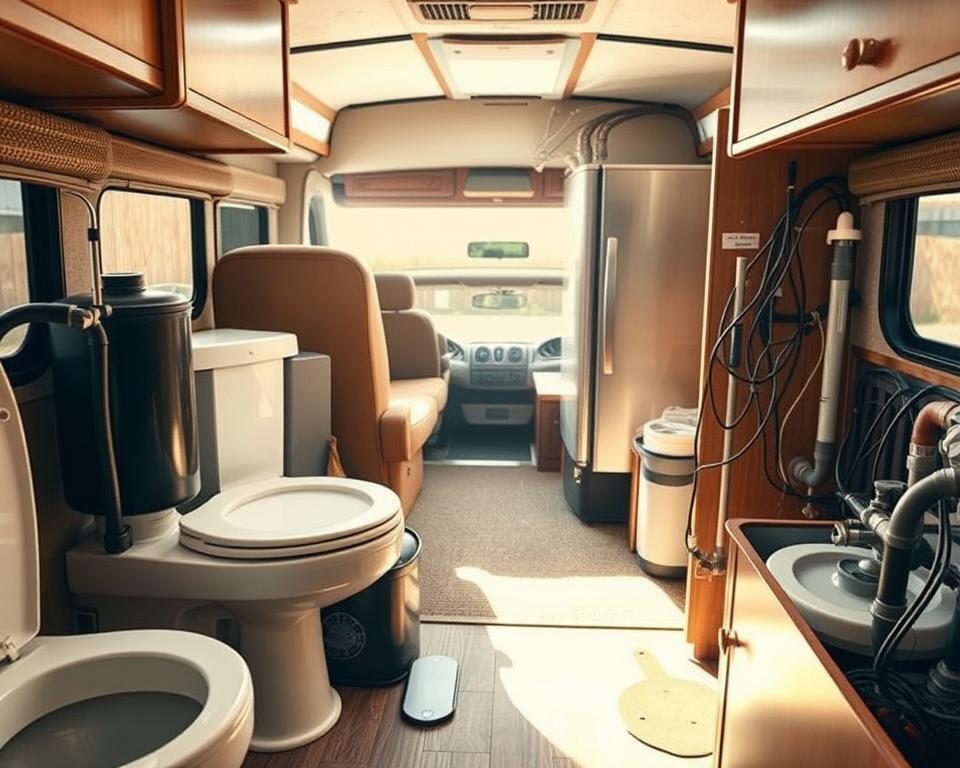Travel Trailer Septic Tank Pumping – Must-Read Guide
Overlooking a camper septic system can rapidly turn an pricey mistake. If you roam with an RV or mobile rig, it’s crucial to understand the necessity of trailer septic Tank Pumping. It maintains your travels are smooth and living conditions remain sanitary during every trip. By highlighting regular RV tank pumping service near me, this manual strives to make you prepared in maintaining your septic system, get-around potential headaches — especially when soaking up the great outdoors.
Within these pages, a deep dive into selecting trustworthy mobile septic services awaits you. What’s more, we cover how to spot when your septic Tank requires urgent attention. Mastering the process for effective RV septic Tank Pumping is also covered. Instead of responding to issues as they arise, allow this guide to arm you with critical knowledge. This helps guarantee your RV experiences remain carefree!
The Significance of Regular RV Septic Tank Pumping
Consistent maintenance of your RV’s septic Tank is crucial for its wastewater system’s efficiency. Delaying this can cause clogs and backups, spoiling your vacation and hurting the environment. Sewage leaks from an full Tank can taint the area, posing major problems.
Using professional Pumping services like All-In Sanitation is a smart move for trailer owners. This decision avoids issues and extends your system’s functionality and longevity. On-schedule Pump-outs deliver a cleaner, safer environment in RV parks and campgrounds.
Understanding Your Trailer’s Septic System
A trailer septic system features three primary elements: the black water Tank, grey water Tank, and fresh water Tank. For RV owners, it’s essential to know these parts. They are key in waste management. The black water Tank holds toilet sewage, while the grey water Tank receives water from sinks and showers.
Each Tank has a separate role in ensuring the rig sanitary and operational. Monitoring the levels in the black water and grey water Tanks is crucial. It prevents overflows, bad smells, and damage to the septic system.
To clarify, below is a table that shows differences between the black water and grey water Tanks:
| Feature | Black Water Tank | Grey Water Tank |
|---|---|---|
| Purpose | Keeps sewage waste | Collects wastewater from sinks and showers |
| Maintenance Frequency | Requires routine Pumping | Needs occasional emptying |
| Potential Issues | Odors, blockages from solids | Risk of grease buildup |
| Typical Size | Generally bigger than grey water Tank | Smaller than black water Tank typically |
Grasping your trailer’s septic system is cornerstone for maintenance. It secures smooth travel experiences. Watching both Tanks translates to trips with minimal septic concerns.

Red Flags Your Septic Tank Needs Pumping
It’s critical to recognize when your septic Tank needs Pumping to keep your system sound. Detecting issues early can sidestep major repairs and environmental harm. Primary signs that call for attention include:
- Slow draining sinks, which may indicate a full Tank or clog.
- Gurgling toilets, indicating blocked pipes or a failing septic system.
- Foul odors around your RV, an early warning of rising sewage.
- Pooling water near the drain field, showing that your Tank may be overwhelmed.
- Sewage backups in your toilets or drains, a clear sign urgent action is needed.
Being mindful of these signs allows RV owners to respond quickly, heading off grave issues. Monitoring your system and responding to these indicators can prolong your septic system’s lifespan. This approach ensures a more enjoyable RV experience.
What Determines Pumping Frequency
A septic Tank’s capacity largely influences how often it demands Pumping. Larger Tanks need less frequent service because they hold more waste, whereas smaller Tanks demand closer-interval Pumping.
The campers present using the septic system also changes Pumping frequency. With more RVs, the system experiences greater strain, necessitating quicker Pumping. Especially during peak seasons, tweaking the schedule is important to avoid problems.
Here is a table that presents recommended Pumping intervals based on typical scenarios:
| Septic Tank Size | Number of RVs | Recommended Pumping Frequency |
|---|---|---|
| 500 gallons | 1-2 RVs | Roughly every 2-3 years |
| 1000 gallons | 2-4 RVs | Around every 3-5 years |
| 1500 gallons | 4+ RVs | As often as 1-2 years |
Properly setting your septic Tank’s Pumping frequency improves its operation. It also lengthens its life and efficiency. This choice is critical for maintaining system health.
Finding a Reliable Septic Pumping Service
Finding a trustworthy septic Pumping service is critical for your trailer’s septic system health. It guarantees swift and efficient Pumping, preventing costly future repairs. When searching for a septic service provider, weigh these key aspects:
- Experience: Search for companies with a solid track record. Their hands-on know-how with various septic systems, especially those for RVs, is paramount.
- Customer Reviews: Check online reviews and testimonials. Glowing feedback and strong ratings are markers of a dependable provider.
- Response Time: Fast response times demonstrate a company’s focus to their customers and willingness to meet their needs efficiently.
- Knowledge of Systems: Specialized knowledge of trailer septic systems distinguishes some services. Providers like All in Sanitation grasp these systems well, enabling specialized service.
Emphasize these considerations to secure the most appropriate service for your septic requirements. A dependable septic Pumping service improves your system’s life and performance, allowing for carefree travel adventures.
Trailer Septic Tank Pumping: The Process Explained
Trailer septic Tank Pumping follows critical steps for efficiency and safety. It’s vital for RV owners to grasp this process before service appointments.
A technician with a trailer-mounted Pump shows up first, suited for mobile systems. This technology enables effective waste removal while protecting the environment. They couple the Pump to the trailer’s system with a hose reaching the Tank.
The Pump then draws the waste out of the Tank. This action is critical to preserve the septic system healthy and prevent overflow. After emptying, the technician examines the Tank for damage or wear, confirming proper function.
Following the Pump-out, waste disposal is paramount. The hauled waste is transported to treatment facilities for safe processing. This step limits environmental harm.
The process gains from the trailer-mounted Pump’s effectiveness. Consistent service saves time and cost, keeping the septic system in prime condition.
Rapid-Response Septic Pumping Services
Sudden issues with your septic system can call for immediate intervention. For RV enthusiasts, recognizing when to call for emergency septic Pumping is vital to prevent further damage and exorbitant costs. Events needing urgent septic Tank Pumping include backups, unpleasant smells, and sewage leaks. Quickly handling these issues often requires septic Tank Pump and haul services to quickly get rid of waste and restore system functionality.
Providers like All-In Sanitation guarantee 24/7 emergency septic Pumping, making sure help is immediately available at any hour. Acting fast with these services greatly improves your septic system’s lifespan and performance. Having a trusted septic service on speed dial can mitigate expenses and stress in emergencies, delivering uninterrupted enjoyment of RV adventures.
Smart Moves for Maintaining Your RV Septic System
Keeping your motorhome’s septic system in top shape is essential. Effective maintenance strategies can prevent pricey problems later. Kick off with regular checks for damage, leaks, or strange smells for RV septic Tank care.
Sensible waste disposal is central for a healthy system. Do not flush items that won’t break down, and stick to septic-friendly products. It’s essential that everyone knows how their actions influence the septic system. This guarantees it stays functional and efficient.
- Perform regular checks for leaks and unusual odors.
- Stay in touch with your septic service provider for timely maintenance.
- Utilize septic-safe toilet paper and cleaning supplies.
- Stop pouring chemicals down the drain that could damage the balance of bacteria in the Tank.
- Schedule for annual professional inspections to spot potential issues early.
Adopting these steps enables RV owners prolong their RV septic systems’ life and performance.
Usual Troubles with RV Septic Systems
Trailer septic systems often experience issues that frustrate RV owners. Handle these issues early to prevent bigger problems later. Clogs in septic Tanks are frequent, mainly due to not disposing of waste properly. To avoid clogs, choose RV-safe toilet paper and perform regular maintenance.
Another big issue is odor control. Bad smells can point to backups or leaks, demanding immediate action. To cut odors, make sure the system is well-ventilated and the septic Tank is emptied on schedule.
Leaks can happen from wear or incorrect installations. Fast identification of leaks aids avoiding environmental damage and keeps the system working. Periodic inspections are important to spot these issues early.
To prevent common issues, implement preventative strategies like regular care and proper waste disposal. Prepared and proactive RV owners can relish their travels stress-free and with peace of mind.
Conclusion
Being savvy about RV septic Tank Pumping is crucial for RV and trailer owners. Regular maintenance and spotting trouble signs in your septic system can enhance your RVing experience dramatically. Managing your RV’s septic system well secures both safety and comfort during your outdoor adventures.
Opting for a reliable service for your camper’s septic Tank Pumping is critical. Engaging experts like All in Sanitation secures your mobile waste management is first-rate. This approach is not just green, but it also elevates* the camping experience, making it more enjoyable and sustainable.
Actively maintaining your septic system lowers emergencies, improving your nature stays. Proper care and know-how allow memorable trips for the best reasons.


